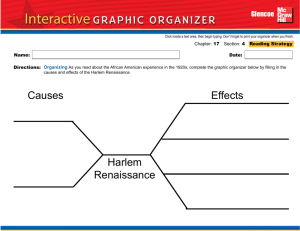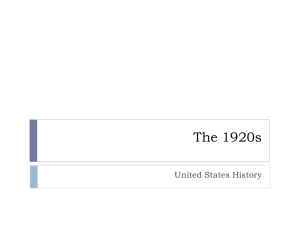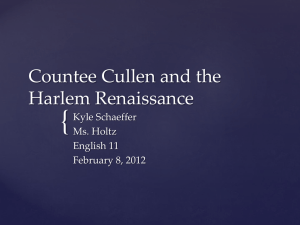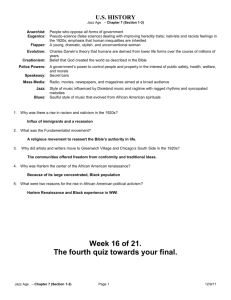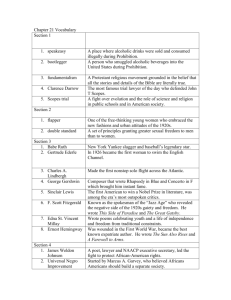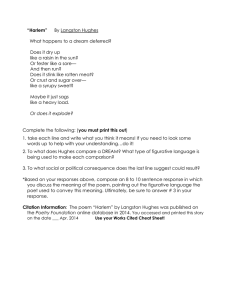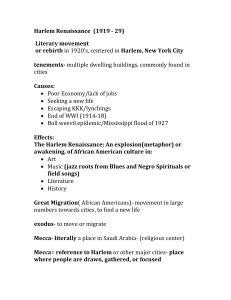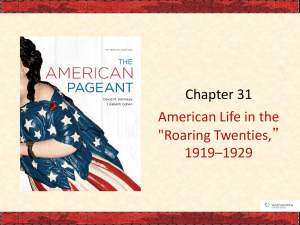harlem-renaissance-presentation
advertisement
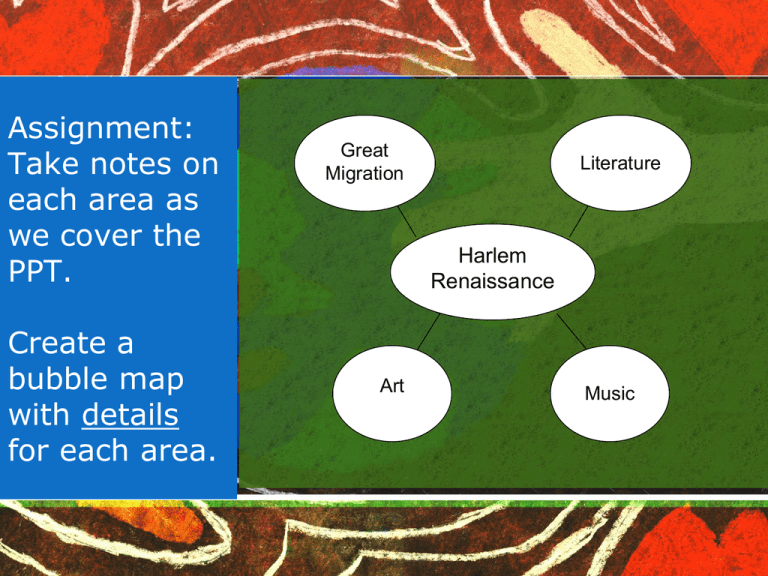
Assignment: Take notes on each area as we cover the PPT. Create a bubble map with details for each area. Great Migration Literature Harlem Renaissance Art Music The Harlem Renaissance of the 1920s “Take The A Train” Billy Strayhorn for the Duke Ellington Orchestra •What is the tone or mood of this recording? •Why do you think the original recording was made and for what audience? •List two things in this sound recording that tell you about life in the United States at the time. What is it? • The Harlem Renaissance was a flowering of African American social thought which was expressed through – Paintings – Music – Dance – Theater – Literature Where is Harlem? The island of Manhattan New York City is on Manhattan island Neighborhoods How does the Harlem Renaissance connect to the Great Migration? • The economic opportunities of the era triggered a widespread migration of black Americans from the rural south to the industrial centers of the north - and especially to New York City. • In New York and other cities, black Americans explored new opportunities for intellectual and social freedom. • Black American artists, writers, and musicians began to use their talents to work for civil rights and obtain equality. How did it impact history? • The Harlem Renaissance helped to redefine how Americans and the world understood African American culture. It integrated black and white cultures, and marked the beginning of a black urban society. • The Harlem Renaissance set the stage for the Civil Rights Movement of the 1950s and 60s. Now that you’ve learned more about the Harlem Renaissance, listen again to this song. Does it change your answers to the analysis questions below? “Take The A Train” Billy Strayhorn for the Duke Ellington Orchestra •What is the tone or mood of this recording? •Why do you think the original recording was made and for what audience? •List two things in this sound recording that tell you about life in the United States at the time. Who do we associate with the Harlem Renaissance? • Artists such as Jacob Lawrence • Authors such as Langston Hughes • Musicians such as Duke Ellington, Louis Armstrong, and Bessie Smith Jacob Lawrence • Jacob Lawrence grew up in a settlement house in Harlem during the Harlem Renaissance • Lawrence's parents were among those who migrated between 19161919, considered the first wave of the migration. • His own life in Harlem , and the struggle of other Black Americans inspired his earliest work Lawrence’s Work • Jacob Lawrence painted his Great Migration series during the 1940s to capture the experience of African Americans during the 1920s http://www.columbia.edu/itc/history/odonnell/w1 010/edit/migration/migration.html Jacob Lawrence Painter Painted scenes of: •his own background in Harlem •the hard life of black Americans in the 1920s The Great Migration series is his most recognized work Langston Hughes • Hughes is known for his insightful, colorful, realistic portrayals of black life in America. • He wrote poetry, short stories, novels, and plays, and is known for his involvement with the world of jazz and the influence it had on his writing. • His life and work were enormously important in shaping the artistic contributions of the Harlem Renaissance in the 1920s. • He wanted to tell the stories of his people in ways that reflected their actual culture, including both their suffering and their love of music, laughter, and language itself. I, too, sing America. I, too, sing America (1920s) To listen to Langston Hughes read his poem, click here. 'I, Too' written just before Hughes’ return to the States from Europe and after he'd been denied passage on a ship because of his color, has a contemporary feel in contrast to the mythical dimension of 'The Negro Speaks of Rivers'. It is no less powerful however, in its expression of social injustice. The calm clear statements of the 'I' have an unstoppable force like the progress the poem envisages. Hughes's dignified introductions to these poems and his beautiful speaking voice render them all the more moving. From PoetryArchive.org I am the darker brother. They send me to eat in the kitchen When company comes, But I laugh, And eat well, And grow strong. Tomorrow, I'll be at the table When company comes. Nobody'll dare Say to me, "Eat in the kitchen,“ Then. Besides, They'll see how beautiful I am And be ashamed-•What is the tone or mood of this poem? •What is the theme of the poem? •Textual evidence to prove your answers? I, too, am America. Wrote poetry, short stories, novels, and plays. Langston Hughes Poet and Author Known for his colorful, realistic portrayals of black life in America. Music “Jazz Age” Jazz music created by African Americans in New Orleans Roots in ragtime & blues, West African rhythms and African American songs & spirituals Considered the only truly “American” music Many thought it corrupted youth Duke Ellington • Ellington was a jazz composer, conductor, and performer during the Harlem Renaissance. • During the formative Cotton Club years, he experimented with and developed the style that would quickly bring him worldwide success. Ellington would be among the first to focus on musical form and composition in jazz. • Ellington wrote over 2000 pieces in his lifetime. The Cotton Club • The Duke Ellington Orchestra was the "house" orchestra for a number of years at the Cotton Club. The revues featured glamorous dancing girls, acclaimed tap dancers, vaudeville performers, and comics. All the white world came to Harlem to see the show. • The first Cotton Club revue was in 1923. There were two new fast paced revues produced a year for at least 16 years. Duke Ellington Composer/Conductor Jazz composer, conductor, and performer during the Harlem Renaissance Louis “Satchmo”Armstrong • Louis Armstrong was a jazz composer and trumpet player during the Harlem Renaissance. • He is widely recognized as a founding father of jazz. • He appeared in 30 films and averaged 300 concerts per year, performing for both kids on the street and heads of state. Composer and trumpet player during the Harlem Louis Armstrong Composer/Trumpeter Renaissance Widely recognized as a founding father of jazz Bessie Smith • Bessie Smith was a famous jazz and blues singer during the Harlem Renaissance. • Smith recorded with many of the great Jazz musicians of the 1920s, including Louis Armstrong. • Smith was popular with both blacks and whites Bessie Smith Jazz & Blues Singer Famous jazz and blues singer during the Harlem Renaissance Popular with both blacks and whites Study the picture for 2 minutes. Form an overall impression of the painting, then start to focus on individual details. Questions to think about: 1. What do you see? 2. What people do you see? 3. What objects do you see? 4. What colors do you see? 5. What actions/activities do you see? 6. What questions does this painting raise in your mind? 7. How does this painting relate to the Harlem Renaissance? 8. Based on what you have observed, list what you may infer from this painting. “Ascent from Ethiopia”, Louis Mailou Jones. 1932 Sample Poetry Analysis I, too, sing America. I am the darker brother. They send me to eat in the kitchen When company comes, But I laugh, And eat well, And grow strong. Tomorrow, I'll be at the table When company comes. Nobody'll dare Say to me, "Eat in the kitchen,“ Then. Besides, They'll see how beautiful I am And be ashamed-I, too, am America. Tips on Analysis • Examine the title of the poem. • Summarize what the poem is saying. • Do any positive/negative images stand out? • Is there a particular audience the poem addresses? • What’s the overall tone of the poem? Does the tone change at all? • What’s the theme or overall message? Sample Written Analysis • Analyze the poem’s theme (overall message). A theme is not a one word response. For example, a poem’s subject might be “family,” but the theme might be how family is the most important thing a person could cherish. – 1st paragraph: Introduce author/poem and poem’s theme. – 2nd paragraph: Provide textual evidence that showcases the poem’s theme. Group Sample Written Analysis In Langston Hughes’ poem “I, Too, Sing America,” the poet explores…. [introduce theme and explain overall message]. In particular, the poem states….[insert textual evidence that directly links to theme. Be sure to explain the quotes you are using].

